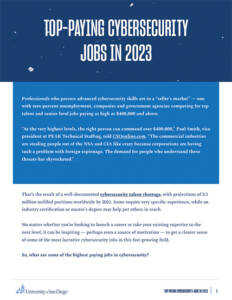Welcome to the Digital Age, aka the Information Age. Part of living and working in this historic 21st century era — characterized by an incredibly rapid shift from traditional industry to an economy based on information technology — is the need to stay up to speed on how we protect our essential information systems and digital data.
For example, consider the terms “cybersecurity” and “information assurance.” Both involve risk management, maintaining and safeguarding the high-tech information systems that are now used across all industries (commerce, banking, telecommunications, health care, national security and more) to store, process and distribute essential data.
However, though the uninitiated may sometimes consider the terms interchangeable, there are also key differences between cybersecurity and information assurance.
What is Cybersecurity?
Cybersecurity refers to the technologies, processes and practices designed to protect networks, devices, programs and data from attack, damage or unauthorized access, according to DigitalGuardian.com. This includes defending against cyberattacks aimed at accessing, changing or destroying sensitive information; extorting money from users; or interrupting normal business processes. PCmag simplifies the definition to: “the protection of data and systems in networks that are connected to the Internet.”
Cybersecurity data breaches occur so frequently these days that only the biggest ones make headlines. The list of notable names that have been hit by hackers keeps growing longer — from restaurants, retailers, universities and social media sites to financial institutions and even government agencies such as the FBI, NSA and IRS.
The field of cybersecurity, relatively new compared to information assurance, is evolving rapidly as organizations scramble to keep pace with online adversaries. The result is a well-documented talent shortage, with some experts predicting as many as 3.5 million cybersecurity job openings by 2021.
[RELATED] 15 Must-Read Cyber Security Facts & Figures for 2019 >>
What is Information Assurance?
Though the modern science of information assurance is relatively new, the practice of securing information dates back to the earliest instances of humans needing to keep secrets. Over the years, information assurance could mean keeping sensitive physical files and documents locked up in a vault to the challenge of transitioning from paper to electronic patient medical records; today the practice continues to evolve as companies and organizations develop new strategies for keeping their vital information, now increasingly in electronic formats, safe and secure.
One way to understand information assurance is to think of it as the practice of ensuring that information systems will perform as needed when needed, and that they remain accessible only to authorized users.
PCmag.com defines information assurance as: The technical and managerial measures designed to ensure the confidentiality, possession or control, integrity, authenticity, availability and utility of information and information systems.
Techopedia details the following five pillars of information assurance:
- Integrity (protection of information systems and assets)
- Availability (dependable access to information systems by authorized users)
- Authentication (process of restricting access and confirming identity of users)
- Confidentiality (restriction of access to authorized users only)
- Nonrepudiation (forensic tracking to create a reliable “paper trail” of all actions)
And though information assurance is sometimes thought of as synonymous with “information security,” these terms also have distinguishing differences.
How Does Information Security Relate to Information Assurance and Cybersecurity?
Telos, a leading provider of information assurance and cybersecurity solutions to government agencies, the intelligence community and commercial enterprises, describes the relationship between these disciplines as follows:
“Cybersecurity is a sub-set of information security, which itself is a sub-discipline of information assurance, which encompasses higher-level concepts such as strategy, law, policy, risk management, training, and other disciplines that transcend a particular medium or domain.”
While information security typically refers to “mitigating risks through secure systems and architecture that eliminate or reduce vulnerabilities,” according to DigitalGuardian.com, information assurance involves “a broader strategic initiative” involving a wide range of processes that can include “security audits, network architecture, compliance audits, database management; and development, implementation and enforcement of organizational information management policies.”
Information Assurance vs. Cybersecurity
Information Assurance
- Traditional field that existed before the Digital Age
- Focus on strategy and protection of all information, both digital and physical
- Protects organizations’ information systems and assets, physical and digital
- Tools and strategies include everything from user education, high-tech systems, firewalls and anti-virus technology to locked file cabinets paper shredders
- Threats emanate from cyberspace; unauthorized personnel accessing protected information on-premises
Cyber Security
- Innovative field that keeps pace with fast-changing technology, tactics and threats
- Focus on protecting digital information and managing risk
- Protects information and data, but also functional systems (ex. electrical grid, transportation infrastructure, any devices connected to the Internet of Things, or IoT)
- Tools and strategies include everything from user education, high-tech systems, firewalls, anti-virus technology to penetration testing and bug bounty initiatives
- Threats emanate from cyberspace; computer-to-computer communications
Information Assurance vs. Cybersecurity: Academic Degrees
In academic circles, too, the two disciplines are perceived as being very closely related, so much so that a number of institutions offer combined degrees in Information Assurance and Cyber Security.
A master’s degree in information assurance typically prepares graduates to protect both physical data and digital information in addition to electronic hardware. Students will often also learn to institute, update and maintain policies and strategies that protect an organization’s most valuable physical and digital materials.
With an information assurance degree, there is typically greater emphasis on the ability to analyze, select and implement the most appropriate systems and strategies than on actually devising the specific tools needed for the job.
In contrast, a master’s degree in cybersecurity will place significantly more emphasis on a deep understanding of how to defeat adversaries from theoretical as well as tactical perspectives, thus providing the capability to evaluate tools best suited to specific threats or vulnerabilities.
Because cybersecurity experts also benefit from specific knowledge and skills in areas related to technology, law, policy, compliance, governance, intelligence, incident response and management, top degree programs instill a range of diverse, multidisciplinary capabilities.
Cybersecurity master’s degrees are available in engineering-focused disciplines as well as overall operations and leadership.
Information Assurance & Cybersecurity: Industry Outlook & Employment Opportunities
Not surprisingly, there is also significant overlap between these two related fields when it comes to the employment landscape. In fact, a recent search revealed a number of job listings that referenced both discipline. For example:
- Cyber Information Assurance Engineer
- Information Assurance Cyber Security Expert
- Cybersecurity Engineer/Information Assurance Associate
Many employers looking for information assurance experts are interested in candidates who also possess cybersecurity background and skills. Job titles that are focused primarily on information assurance include:
- Information Assurance Analyst
- Information Assurance Engineer
- Information Assurance Specialist
- Information Assurance Manager
- Information Security Analyst
- Information Assurance Technical Support
- Information Assurance/Security Engineer
In terms of salary, a recent Glassdoor.com report referenced an average salary for Information Assurance Analysts of $80,000. Cybersecurity analysts are compensated at a similar level, but higher-level job opportunities create a higher salary ceiling for cybersecurity executives, with chief information security officers averaging $240,000 in the Silicon Valley area and ranging as high as $380,000.
In addition, the ongoing talent shortage across the cybersecurity domain means there is a broader spectrum of job opportunities. Some examples include:
- Lead Software Security Engineer
- Chief Information Security Officer (CISO)
- Security Architect
- Penetration Tester
- Information Security Crime Investigator/Forensics Expert
- Bug Bounty Hunter
- Cloud Security Architect
- Cyber Insurance Specialist
- Cybercrime Investigator
- IoT Security Specialist
- Network Security Administrator
- And more
Cybersecurity & Information Assurance: What the Future Holds
The fields of information and cybersecurity are both essential to the secure operation of government and business systems throughout the world, and opportunities for educated, well-trained professionals will only continue to expand.
Additionally, whether you are employed in a risk management, engineering or leadership role at a wide range of government agencies or private sector companies, you will be engaged in challenging, meaningful, vitally important work.






